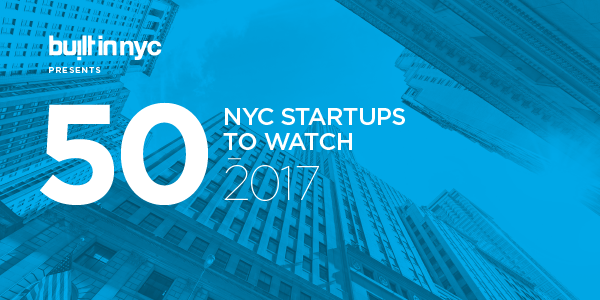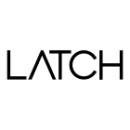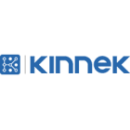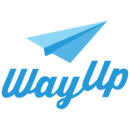
In 2016, New York City’s tech sector continued to mature, with startups blossoming among the city’s legacy industries while a steady flow of venture capital poured into real estate tech, food-tech, fintech, digital media and healthcare tech industries, to name a few.
But what does 2017 have in store? Built In NYC has carefully selected 50 young companies (all less than five years old) that we believe will make a big splash over the next 12 months.
Here are the 50 NYC startups to watch in 2017:

- Transfix: On-demand trucking
Put simply, Transfix is an on-demand trucking provider — the "Uber for trucks." The company employs an online marketplace with algorithms that match freight with available vehicles based on location to reduce the amount of empty miles driven by truckers. The company was founded in 2013 and has raised $35.8 million to date.

- Stash: Micro-investing platform
Stash, a micro-investing platform aimed at millennials, has been making waves in the fintech space this year. In August, the company closed a $9.25 million Series A, quickly followed by a $25 million Series B in December. The company’s technology helps users take ownership of their investments with confidence, charging just $1 per month for accounts under $5,000 and 0.25 percent a year for accounts over $5,000. We caught up with Stash co-founder Ed Robinson to find out the important lessons the company learned while raising venture capital this year.

- Kustomer: One-stop-shop for customer service
Kustomer’s mission is simple — re-humanize customer service. Looking to fix the broken relationships between brands and consumers, the company’s technology provides a one-stop-shop for all customer conversations, from inquiries to complaints to comments. The platform also lives across all forms of communication channels, including email, text, social and live chat, doing away with the age-old ticket system. Back in September, the company came out of stealth with $12.5 million in fresh funding, and in November, the company launched out of closed beta.

- Bread: Alternative lending platform for e-commerce companies
Bread’s alternative lending platform allows e-commerce companies to give their customers easy-to-understand options to pay over time. The company’s technology integrates into merchant’s sites, allowing customers to see personalized, monthly pricing as they shop. While Bread’s product helps companies boost sales, the platform also pays merchants upfront, charging interest to customers.

- Cadre: Connecting investors with real estate operators
Cadre’s online marketplace connects investors with real estate operators. The company’s technology facilitates transactions and powers predictive analytics for investors, essentially cutting out the middleman in real estate investing. The company was founded by Ryan Williams, Jared Kushner and Josh Kushner, and is backed by Goldman Sachs, Alibaba founder Jack Ma and actor Ashton Kutcher.

- MoneyLion: Mobile-first personal finance platform
MoneyLion is a mobile-first personal finance platform that helps users manage their spendings, savings and credit using artificial intelligence and analytical models. Since launching in 2013, the company claims to have tripled its loan business volume year over year, with 150,000 loans originated on the platform.

- Latch: Smart lock for the enterprise market
Latch is an up-and-coming Internet of Things company, having spent its first two years in business developing its inaugural product. After launching out of stealth in February of 2016, the company unveiled its smart lock, which targets the enterprise market. Specifically, the lock is designed for multi-occupancy apartment blocks (such as offices).

- Ellevest: Digital investment platform for women
Sallie Krawcheck, a former titan of finance at companies like Citigroup and Bank of America, and Charlie Kroll, founder of fintech company Andera, launched robo-advisor Ellevest in 2016 to help women invest their money and secure their financial futures. While companies like Betterment and Wealthfront have paved the way in the automated investing space, Ellevest considers behavioral differences between men and women — such as salary trends and career breaks — when it comes to investing. Built In spoke with Kroll, who explained how Ellevest’s research found that women and men typically know the same amount of information when it comes to investing.

- Helix Sleep: Ultra-personalized mattresses
Helix Sleep is part of the "Mattress 2.0" movement, disrupting the long-standing mattress industry among the likes of New York-based Casper. However, Helix Sleep differentiates itself in the space with its ultra-personalization of the sleep experience — the company forgoes a one-size-fits-all model and designs mattresses based on a customer’s weight, height, sleep positions and mattress-type preferences. In August of 2016, Helix Sleep raised a $7.4 million Series A and is projected to generate $50 million to scale both online and in its physical showrooms, where customers can schedule individualized sleep consultations.

- Morty: High-tech mortgage broker platform
Morty is a next-generation mortgage platform founded in 2016. The company acts as a high-tech mortgage broker, allowing users to submit one common application, evaluate lenders, rates and products, choose a loan and close it — all through its digital platform.

- Nomad: Full-service marketplace for healthcare jobs
Nomad is a full-service marketplace for healthcare jobs. The company utilizes a cloud-based platform to connect doctors with freelance clinical work at hospitals. Nomad was founded in 2015 by former physician Alexi Nazem and Zander Pease, participating in Grand Central Tech’s cohort as it got off the ground.

- The Guarantors: Helping NYC residents qualify for their leases
If you’ve ever rented an apartment in New York City, you’re familiar with how landlords typically require tenants to earn an annual gross income of 40 to 50 times their monthly rent. As such, in order to qualify for an apartment, many renters need a guarantor to co-sign their lease. The Guarantors helps New York residents qualify for their prospective leases in under 12 hours, keeping time with the city’s fast-paced real estate market.
- Ollie: On-demand, healthier pet food
Ollie broke into New York’s tech scene in 2016 after founders Alex Douzet, Gabby Slome and Randy Jimenez decided to disrupt the premium pet food space with healthier options and on-demand delivery. The team partnered with canine nutritionists to develop personalized formulas that cater to dogs, which are then delivered to pet owners’ homes on a regular schedule. In October, Ollie raised a $4.4 million round, co-led by Primary Venture Partners and Lerer Hippeau Ventures.

- TodayTix: Marketplace for last-minute theater tickets
New York has long stood as a global capital for theater, and as a result, scoring tickets to a Broadway show can be challenging and expensive. TodayTix makes it easy to find last-minute theater tickets to many sought-after shows in New York, from musicals to comedy to opera performances.

- Offrbox: Residential investing platform
Offrbox is a residential investing platform that lets users search, make offers and close deals within hours. The company launched in beta in July of 2016 and has since become one of the largest online real estate marketplaces for residential investors.

- Clarifai: Cutting-edge visual recognition technology
Clarifai builds cutting-edge visual recognition technology, capable of teaching a computer to recognize complex objects in a matter of seconds. Companies like BuzzFeed, Unilever and Touchnote use Clarifai to help index their photos, but the company’s long-term goals include using artificial intelligence to understand all images and videos. Clarifai’s CEO Matt Zeiler told Built In the company was built on the belief that everyone should have access to artificial intelligence, regardless of budget, infrastructure or skill level. In October the company raised a $30 million round of funding to expand its engineering, business and research teams.

- Pager: Doctors on demand
Pager lets users order a doctor on demand, reinventing the traditional house call. Patients can request a board-certified doctor to treat urgent care needs in their home, office or hotel, providing a convenient alternative to crowded emergency rooms and doctor’s offices.

- Abacus: Real-time employee expense solutions
Abacus is a modern solution to the oft-dreaded expense report. The company got off the ground after partaking in Y Combinator’s Winter 2014 cohort and launched with a mission to pay back employees as quickly as possible for corporate expenses. The company’s technology utilizes machine learning to pinpoint the expenses financial controllers need to review, and automatically approves about 80 percent of expenses that fall within company guidelines through its predictive platform. Built In spoke with Abacus co-founder Omar Qari on the company’s recent integration with Slack and why the company chose to set up shop in New York City.

- Andela: Bringing Africa's best tech talent to the U.S.
The tech industry is often criticized for having a "pipeline problem," meaning racial and gender minorities are underrepresented in computer science and engineering programs. Andela’s goal is to offset this issue. The company, which launched in 2014, operates a unique training program for African software developers, placing the top one percent of tech talent across Africa with U.S. tech companies as full-time, distributed team members. In June of 2016, Andela raised a $24 million round led by the Chan Zuckerberg Initiative, an investment fund set up by Facebook founder Mark Zuckerberg and his wife, Dr. Priscilla Chan.

- Kinnek: E-commerce marketplace to find equipment, supplies
Kinnek is an online marketplace that helps small businesses find equipment and supplies. The company was founded in 2012 by Karthik Sridharan and Rui Ma, who discovered that finding customer suppliers quickly and efficiently was a real pain point for small business owners. The company has since raised over $31.5 million in venture capital.

- WayUp: Job portal for students and recent grads
WayUp’s job portal makes it easier for students and recent grads to score internships and jobs. The company was founded by Liz Wessel and JJ Fliegelman in 2014, and now, big name employers like Google, The New York Times and Uber post jobs on the company’s site.

- Glossier: Modern beauty startup
Glossier, an online-only beauty startup, launched just over two years ago as an outgrowth of founder and CEO Emily Weiss’s beauty blog, Into The Gloss. The company has raised a whopping $34 million in venture capital and now counts over 40 employees.

- AND CO: Automated business tech for freelancers
While building a career as a freelancer is hard work, AND CO is working to empower independent workers with technology that helps automate their business. The company launched out of beta this past October with a platform that helps freelancers manage their invoices, file expenses, track time, manage projects and receive payments on contract work through a smart bot that generates automated reminders.

- Lemonade: Peer-to-peer insurance startup
Lemonade is a peer-to-peer insurance startup founded in 2015 by Daniel Schrieber and Shai Wininger. The pair built the platform in an effort to bring a faster and more affordable insurance model to homeowners and renters. Currently, the company’s policies for renters and homeowners insurance start at $5 and $35 a month, respectively, which is two to four times less than the industry standard.

- Ando: Mobile-only food delivery from David Chang
In 2016, Momofuku chef and owner David Chang launched a new type of food venture, marrying his revered brand with tech. The recent upstart is called Ando, a mobile-only food delivery company focused on bringing restaurant-quality food to customers. In November, Ando landed a $7 million funding from a star-studded lineup of investors, which included Jimmy Fallon and Aziz Ansari, to name a few.

- Backtrace: Debugging technology for enterprise software
Backtrace is building debugging technology for enterprise software. The company was founded in 2014 by Abel Mathew and Samy Bahra, two former AppNexus engineers who set out to improve upon the debugging process for developers. In December the company raised a $6.1 million round and currently counts AppNexus, MediaMath, Circonus and Fastly among its customers.

- Burrow: Direct-to-consumer couches
What Casper brought to mattresses, Burrow is bringing to couches. The startup graduated from Y Combinator’s Summer 2016 cohort, focusing on a direct-to-consumer, one-size-fits-most model. Burrow couches are designed for mobility, and they will deliver the piece directly to your door with compacted shipping.

- Capsule: On-demand prescriptions
While waiting in long lines at a pharmacy is a regular occurrence for most, Capsule is rebuilding the pharmacy experience by providing an on-demand service for prescriptions. At no cost to consumers, the company employs a fleet of HIPAA-certified couriers who deliver prescriptions straight to customers’ homes or offices within a two-hour window. Built In caught up with Capsule founder Eric Kinariwala to discuss how the law takes away from the pharmacy experience, naturally paving the way for Capsule’s on-demand and predictive technology.

- Cheddar: Live, on-demand video news
In New York’s crowded media landscape, freshly launched live and on-demand video news startup Cheddar made waves in 2016. Founded by former BuzzFeed president and COO Jon Steinberg, the company focuses on business news surrounding technology, media and innovation topics. Back in September, Cheddar raised $10 million to build out its programming and team.

- Clarity Money: Financial insights platform
Clarity Money provides insight into your finances. Using the platform, you can cancel and lower bills, receive loans, set up a savings account, monitor your daily spending, manage your subscriptions or even apply for a lower credit rate. Just this month, the company launched its iOS app out of beta to help users start saving money instantly.

- Electric: Automated, intelligent IT support
Electric launched in late 2016 with a mission to overhaul an outdated IT industry. The company employs an automated, intelligent IT support channel to help solve small- and mid-sized companies' IT problems in real-time — and for a much lower cost than traditional IT service providers. The company also raised $2 million in seed funding in November and is currently focused on building a solid culture where revenue and engineering move in lock-step.

- Emissary: Business intelligence for sales teams
Emissary helps sales teams close big deals using business intelligence. The company launched in November with a $12 million round and works to connect sales organizations with former corporate executives (dubbed “emissaries”) of the companies they’re prospecting.

- Frip: Helping teachers plan unique field trips
School field trips are often repetitive, with classrooms visiting the same museums year after year. Frip wants to make it easier for teachers to find and plan new, off-the-beaten-path field trips in New York. The company is still in beta, but it provides teachers with curated lists of potential field trip locations broken down by student age and subject matter.

- Honey: Social network for employees
Tackling the realm of enterprise social networks, Honey’s platform is a social intranet where employees can discover, share and archive company resources and shared interests. The company’s intuitive UX is designed to empower the modern office worker, making it easy for employees to organize project files, share industry news, relay HR policies and provide links to a myriad of professional tools.

- Hooch: Members-only cocktail app
Subscription-based Hooch wants to give you 30 drinks for the price of one. Really. For $9.99 per month, the company’s app scores users one free drink at any of the company’s hundreds of venue partners on any given day. Hooch launched in New York City in 2015 and now counts over 100 local venue partners. They've also expanded to Los Angeles, New Jersey, Austin, Dallas, Miami, San Diego, Phoenix, San Francisco and Hong Kong.

- Juno: Ride-sharing that puts drivers first
Juno is the latest entrant into the crowded ride-sharing space in New York City, competing with prominent brands like Uber, Lyft and Gett. The company sets itself apart by putting the welfare of its drivers first, which it does through benefits like only taking a flat 10 percent commission fee from every ride (versus Uber’s 25 percent), paying for drivers’ cell phone plans and offering equity.

- Kit: Product discovery platform
Another New York City startup born out of Expa’s startup studio is Kit, a product discovery platform that allows users to search and recommend products — all grouped into categories of interest called "kits." In November, the company raised a $2.5 million seed round, which it plans on using to build out its team, iterate on its product and expand its capabilities when it comes to search and monetization.

- Littlstar: On-demand VR content
Littlstar wants to be the YouTube, Hulu and Netflix of virtual reality. The company graduated from the Disney Accelerator in 2015 and has since grown its community of content creators, allowing users to watch VR content from channels such as ABC, Showtime, Discovery, Nat Geo WILD, PBS and Esquire across many different devices.

- Lola: Subscription-based feminine care
Targeting the multi-billion dollar tampon industry, Lola’s subscription-based product delivers a box of 100 percent organic cotton tampons to customers’ homes each month. While big brands are not required by the FDA to disclose the ingredients in tampons, Lola is transparent, convenient and looking to overhaul standards in feminine care. Back in December, the company raised a $7 million round, which included an investment from actress Lena Dunham.

- MoneyMio: Bilingual, culturally relevant financial information
MoneyMio is the first consumer platform to provide financial content and comparison tools that are bilingual and culturally relevant, targeting a huge demographic that is underserved when it comes to financial education. José Galindo founded the company in 2015 to help improve financial literacy for Spanish and English-speaking Latinos.

- One Drop: Diabetes management app
One Drop is a diabetes management platform using mobile computing and data science to empower people with diabetes to live healthier lives. The company’s app allows users to track their glucose levels, monitor their food intake and physical activity, as well as set reminders to take their medicine.

- Raden: Connected smart luggage
Raden uses integrated technology to bring travelers high-quality, connected smart luggage. The products solve many of the pain points of traveling, employing a low energy Bluetooth to track your bag’s location, a hidden scale in the handle of the bag to weigh your bag and a charging station for electronics.

- Reserve: Digital concierge for restaurants and diners
Reserve is a digital concierge service for both restaurants and diners focused on making every part of the dining experience better. Born out of Expa’s startup studio, the company melds hospitality and technology, providing customized restaurant recommendations to customers and table management solutions to restaurants. Since launching in 2014, Reserve has worked with over 600 restaurants in New York City, San Francisco, Los Angeles, Boston, Philadelphia, Washington D.C. and Chicago.

- Rockets of Awesome: Personalized online kids' clothing
Rockets of Awesome is an online kids’ clothing retailer that takes the hassle out of shopping for children. Instead of dragging kids to the store to shop for new clothes, parents can shop for their children’s clothing online based on style preferences. The company uses algorithms to design and hand-pick clothes that meet kids’ individual needs and then ships the clothing to families’ homes four times a year. Since launching in July of 2016, the company has shipped over 100,000 units and raised $12.5 million in venture capital.

- Roam: Global co-living
While we’ve seen coliving upstarts like Common and WeLive gain traction in New York, Roam caters to entrepreneurial nomads who wish to work and live around the world. The company operates an international network of interchangeable, design-led communal living spaces, for which users pay one lease to use. Following a new financing round in May, Roam plans to open new locations in Buenos Aires and London. The company currently has spaces in Miami, Madrid and Ubud, Bali.

- Simple Contacts: Reorder contacts online without an office visit
As suggested by its name, Simple Contacts makes getting your contacts simple. The company provides a standard ophthalmology test online, so users can reorder their contacts without the hassle of an office visit. The company was founded by Joel Wishkovsky and Ryan Quigley in 2015 and is now available in 20 states.

- Thrive Global: Science-based solutions to cut stress, enhance productivity
In 2016, Huffington Post founder Arianna Huffington announced she was leaving her position as Editor in Chief of the blog to start her new venture, Thrive Global. The startup, which officially kicked off in November, provides science-based solutions to lower stress and enhance productivity for companies and individuals alike.

- Troops: CRM data hub for sales teams
Troops, a bot that lets users speak with their Salesforce data, launched out of beta in September of 2016 on the heels of a $7 million funding. Troops allows users to instantly push and pull CRM data in and out of Slack, turning it into a sales hub for teams. At its core, the new company is innovating enterprise workflows through messaging, iterating on the future of how people use Salesforce with a focused, intelligent product.

- Wade and Wendy: AI for the recruiting space
Wade and Wendy is using artificial intelligence to shake up the recruiting space. The company operates two conversational personalities — Wade and Wendy — who act as a personal adviser throughout a user’s career and a candidate vetting tool for companies, respectively. The company was founded in 2015 and has raised $1.5 million to date, including a backing from Slack.

- Yosi: Cloud-based patient onboarding
Yosi’s mobile platform aims to eliminate patient intake from waiting rooms in doctor’s offices. The company provides an end-to-end, cloud-based patient onboarding and communication solution to help make doctor’s offices paperless. The company participated in Dreamit Ventures’ fall cohort in 2016.


















































